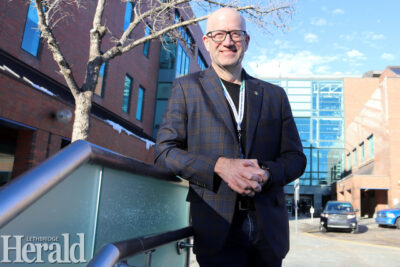Regional lead discusses new medical training program
By Alejandra Pulido-Guzman - Lethbridge Herald on December 12, 2024.
 Herald photo by Alejandra Pulido-Guzman
Lethbridge physician Dr. Richard Buck has been named Regional Lead for the new Southern Alberta Medical Program.
Herald photo by Alejandra Pulido-Guzman
Lethbridge physician Dr. Richard Buck has been named Regional Lead for the new Southern Alberta Medical Program.LETHBRIDGE HERALDapulido@lethbridgeherald.com
The Southern Alberta Medical Program has named Lethbridge physician Dr. Richard Buck as their regional lead as it prepares for its first cohort of undergraduate medical students.
The SAM program will see an increase in the training of rural physicians immediately with undergraduate medical students beginning at the University of Lethbridge in 18 months, as it aims to improve the availability of physicians in rural areas.
Dr. Buck has extensive training and experience in medical education, first earning a Bachelor of Education and Bachelor of Science from the University of Winnipeg before completing his medical degree at the University of Manitoba in 2001.
He recently spoke to the Herald and said once the opportunity for the role became available he applied almost immediately and was very excited to have been selected for his new role.
“In the fall time, they advertised for the position and I applied. They gave me the job, so here we are. I’m going to be responsible for the implementation of the satellite medical school of University Calgary. This is a University of Calgary medical school program being housed by the University of Lethbridge,” said Buck.
He explained that it is a unique relationship between the two and both parties are very interested and excited to make sure that it is very successful.
 “From day one, we will have medical students from the first day of education in their medical career to the point where they graduate medical school,” said Buck.
 He said in the past there has been medical students who come down here to do their rotations, but they have always done the beginning of their training up in urban centres like Calgary and Edmonton and now they will have the opportunity to do it regionally.
 Buck has long been a proponent of preparing the next generation of physicians. He’s participated in doctor training from the time he completed his own residency, working as a site director and in an administrative capacity. He takes pride in helping young physicians find their way.
 “I’ll be the person helping out with the arrangement of that process. Because of this I will have to step back a little bit, but I will still practice clinical medicine in the emergency department, here at Chinook Regional Hospital,” said Buck.
 He said his colleagues have been very supportive as they recognize how important the project is and are willing to help him make it work.
Buck said he is excited to see the next generation of doctors graduates and the positive impact this will have on southern Alberta.
“If we actually look at timelines, the impact of this medical school locally may not be filled for another six years because the first cohort will be starting in July of 2026. It is a three-year medical school program and then at minimum two years for family practice residency,” said Buck.
 He said that even though this might be a bit disheartening as it does not solve the doctor shortage many are facing right now, he hopes people get excited about it.
 “It does take years to make a physician. But who knows, maybe if we have a really successful medical school, hopefully this will encourage folks to come to southern Alberta to actually practice here. So even though we may not be seeing our graduates, seeing patients independently for six to seven years, who knows what the medical school might bring,” said Buck.
He explained the SAM program will run in the old neuroscience building, after it gets some renovations done to accommodate for classrooms and other student spaces needed to run the program successfully.
“Right now, the priority of my team is to get that building ready for the incoming students as well as organizing the curriculum that they need to learn,” said Buck.
 He said currently they are assessing the functionality of the building and what needs to be improved or changed to meet their needs.
 “We need lecture halls, places where the students can meet in small groups, spots where they can study, spots where they can relax. They need an anatomy lab, some type of bookstore, they will also need a spot where they can meet, chat with and examine patients,” said Buck.
 He said the examinations may not happen at the university, they may happen at clinics or hospitals.
When it comes to the application process for those wishing to attend the medical school, Buck said they will be accepting applications as early as Summer or Fall of 2025 and following the admission process from the university of Calgary.
“We are hoping that we can reach, recruit and retain local candidates. Just speaking from hallway conversations, there’s a lot of people in town that would like to go to medical school, but it’s hard for them to uproot their lives and their families to go to a bigger centre such as Calgary, so this is amazing opportunity,” said Buck.
 He explained that at the present time, University Calgary requires some type of undergraduate training at the university level in order to apply to medical school.
 “Many of the applicants will have a degree in some way, shape or form. It doesn’t necessarily have to be in the sciences, it can be from humanities, or relevant things as well too. The candidates also have to write what is called the M cap, which is a Medical College admissions test,” said Buck.
26-25


